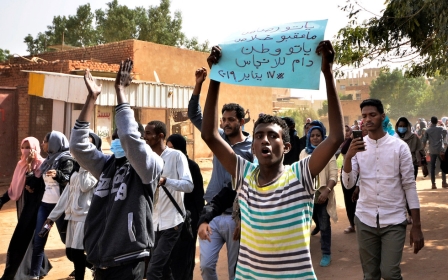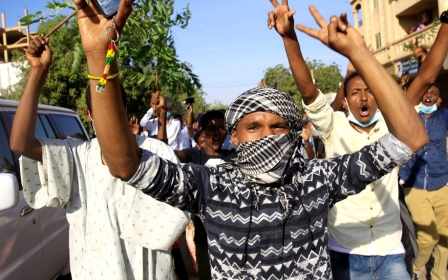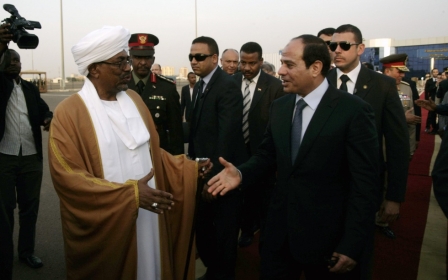Sudanese protesters rally outside home of man killed amid anti-government rallies
Sudanese security forces have fired live ammunition in clashes with thousands of mourners rallying outside the home of a man who died on Friday after being injured during earlier anti-government protests in the capital Khartoum.
Witnesses told Reuters that more than 5,000 people gathered outside the home of 60-year-old Moawia Othman, which has remained the focal point of a stand-off between protesters and security forces.
According to the Sudanese Doctors' Committee, Othman was shot by security forces inside his own home after he offered refuge to protesters in the Burri neighbourhood of Khartoum.
Protesters also rallied outside the home of Dr. Babakir Abd al-Hameed, who was also killed on Thursday amid widespread protests calling for the ouster of Sudanese President Omar al-Bashir. A child was also killed on Thursday, the doctors' committee said.
Sudanese police, however, said on Friday that the anti-government protests from a day earlier had left "only two" people dead.
"Only two people died and not three. I insist that only two people died from their injuries," police spokesman General Hashim told reporters, according to an AFP news agency report.
Hashim added that security forces had not fired live ammunition at demonstrators.
Protesters poured into Burri's Royal Care Hospital, where the pair died, throughout the night to stage a sit-in that was eventually dispersed around 4am on Friday.
Translation: Burri at 5:30pm, from in front of the home of the martyr Moawiya
A residential district of Khartoum, Burri has been a focal point for demonstrations in the capital since anti-government rallies first erupted last month across Sudan.
In its statement on Thursday, the doctors' committee accused Sudanese authorities of blocking ambulances from entering Royal Care Hospital, which prevented protesters from receiving timely medical care.
The committee said security forces stormed al-Faisal Specialised Hospital, also in Khartoum, "and fired tear gas inside the hospital's emergency unit".
“They even arrested some doctors and other employees of the hospital," it added.
Sudanese officials say 24 people have been killed in anti-government demonstrations since they began on 19 December, while human rights groups put the death toll across Sudan at more than 40.
The rallies kicked off in response to increasing living costs and rapidly morphed into a wider call for President Omar Bashir to step down as they spread to several parts of the country, including the war-torn Darfur region.
At least nine people were wounded in the rallies in Khartoum on Thursday, as eyewitnesses told Middle East Eye that security forces fired live ammunition and tear gas at protesters.
'Unbridled killing spree'
On Friday, protesters took to the streets in several areas in and arond Khartoum, including Burri, the northern district of Bahari and Omdurman, the capital's twin city.
In Omdurman, which has seen widespread protests in recent weeks, protesters chanted "Freedom, peace, justice" inside a mosque, where people had gathered for weekly Friday afternoon prayers, AFP reported.
"After the prayers they streamed out of the mosque chanting slogans against the government," a witness told the news agency.
The rallies were quickly dispersed by riot police throughout the day.
Meanwhile, Amnesty International called on the Sudanese security forces to halt "their deadly onslaught on protesters and medical professionals", accusing them of engaging in an "unbridled killing spree" following the deaths on Thursday.
The rights group said it received reports of security forces firing tear gas into homes and buildings in Burri. Security officers also raided medical facilities, firing tear gas inside hospitals and assaulting doctors, it said.
"It is an outrage that Sudanese security forces continue to use lethal force on protesters and key service providers like doctors, killing people in an unbridled spree that is even affecting children," Sarah Jackson, Amnesty's deputy director for East Africa, said in a statement.
Jackson called on the Sudanese authorities to reign in the security forces and "end the continued onslaught against medical facilities and personnel, injured protesters and other people seeking treatment in hospitals".
"By participating in these protests, the people of Sudan are exercising their legitimate rights to freedom of expression and peaceful assembly. Instead of trying to curtail these rights, the government should address the root causes of the economic crisis that has driven the people to the streets," she said.
Bashir defiant amid protests
The Sudanese president has so far resisted demands to step down, blaming the ongoing unrest in Sudan on unidentified Western forces.
Bashir has also said political change will only come at the ballot box, not through demonstrations, and vowed to stay on in order to maintain stability in the country.
Meanwhile, the United Nations on Thursday condemned the use of force against the protesters, urging the government to guarantee Sudanese citizens' rights to free expression and assembly.
"I am very concerned about reports of excessive use of force, including live ammunition, by Sudanese state security forces," UN High Commissioner for Human Rights Michelle Bachelet said in a statement on Thursday.
"I also call on the authorities to ensure that all those arbitrarily detained for the exercise of their rights to freedom of peaceful assembly and expression are promptly released, and that these rights are fully protected," Bachelet said.
The UN Security Council also called on Sudan to respect the rights of protesters and to investigate the violence.
"We are appalled at reports that security forces have used tear gas and violence within hospitals against those being treated and against doctors providing medical assistance," British Deputy Ambassador Jonathan Allen said on Thursday, as quoted by AFP news agency.
New MEE newsletter: Jerusalem Dispatch
Sign up to get the latest insights and analysis on Israel-Palestine, alongside Turkey Unpacked and other MEE newsletters
Middle East Eye delivers independent and unrivalled coverage and analysis of the Middle East, North Africa and beyond. To learn more about republishing this content and the associated fees, please fill out this form. More about MEE can be found here.




